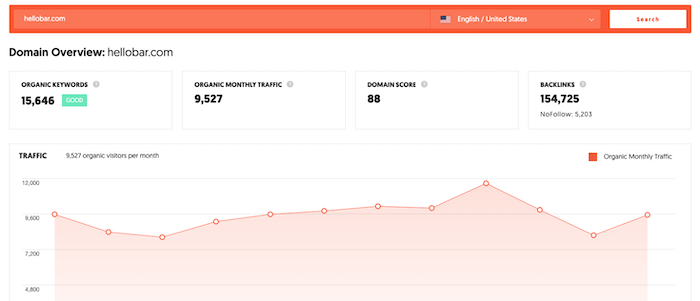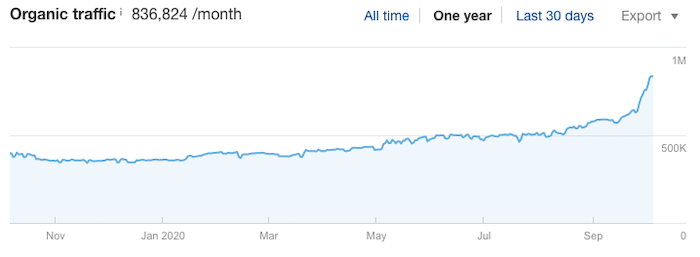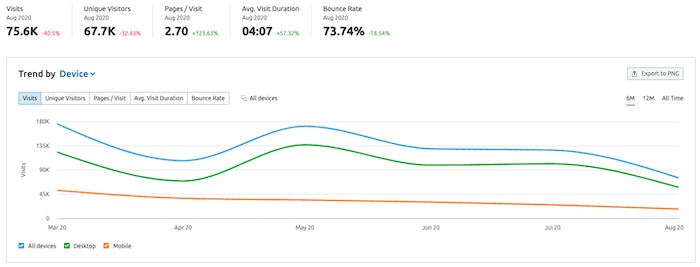
As website traffic is the number of people who visit your site, it forms your website’s foundation. Without traffic, no one reads, clicks, signs up, or buys.
Sure, you might check your traffic daily, but do you know what to look for? Or how to check the website traffic of your competitors?
Let’s explore the whys and hows of monitoring—and improving—your traffic, as well as how to check website traffic from some of the sites you’re competing against in search results.
Why Should You Monitor Website Traffic?
You can’t improve what you don’t measure.
Whether you’re looking to generate more sales, get more email signups, or increase your advertising income, you first need to know where you’re at right now.
That means diving into your website statistics to figure out where your traffic is coming from and how it’s engaging with your site (as well as competitors).
So, how do you check website traffic for your website?
How to Analyze Your Website’s Traffic
There is only one standard tool you should take into account when analyzing your site traffic: Google Analytics.
Connected directly to your website, Google Analytics tells you exactly how many visitors your site is getting, where they’re coming from, how they’re interacting with your content.
But what data should you pay attention to?
Website Traffic Statistics to Consider
- Unique visitors: People who visited your site at least once within the selected date range
- Pageviews: The number of pages viewed on your website within a selected date range
- Organic search traffic: A count of the people who visited your site via a search in Google or another search engine
- Other traffic channels: How many visitors your site gets from other channels such as Facebook and Youtube, as well as from referral traffic (visitors clicking on a link to your website from another website)
While there are many more statistics tracked by Google Analytics, these are the main ones to look at when analyzing your site’s traffic.
Things aren’t so straightforward when you want to check your competitors’ website traffic, though.
Analyzing Competitors’ Website Traffic
When checking website traffic of sites that aren’t yours, you’ll usually want to know more than how many visitors they’re getting. Some good reasons to analyze your competitors’ traffic are:
- To figure out which of their posts or products generate the most organic traffic
- To know which keywords generate the most traffic
- To see which channels are driving the most traffic
Unfortunately, you can’t just log into their Google Analytics to get this data. So, where can you get it instead?
Top Tools for Checking Website Traffic
A wide range of tools, both paid and free, allow you to check website traffic. The ones below all have solid reputations and are worth checking out.
Ubersuggest
Our tool, Ubersuggest, has competitive pricing and unique combination of SEO courses, coaching, and research tools in addition to traffic estimates and keyword information.

Curious? Sign up for a free account using your Google login to check it out.
Ahrefs
Ahrefs is one of the most popular and complete SEO audit tools out there. Its organic search overview report gives a good idea of the kind of organic traffic a site is getting and which keywords are bringing the traffic. You can use that data to go after the keywords that are bringing your competitor traffic.
Ahrefs only gives you an estimate for a site’s organic traffic. It won’t tell you anything about its traffic from sources like social media.

A test done by Ahrefs showed their tool underestimated unique organic visitors for 74.14% of the websites they looked into.
Ahrefs has a seven-day trial. After that, you need to opt for one of their paid plans.
SEMrush
Like Ahrefs, SEMrush is a complete SEO audit tool with an extensive range of features. One of those is its traffic analytics report, which shares data such as an estimated number of unique visitors, traffic sources, top pages, and more.
SEMrush also shows you which keywords your competitors are ranking for. Based on this and the keyword’s search volume, you can estimate how much traffic each keyword brings to your competitors.

SEMrush has a free version that includes the total organic traffic of a site and its five top-performing keywords. If you want more details, you need a premium subscription.
SimilarWeb
SimilarWeb offers an overview of a site’s total traffic, its top traffic sources, and which countries traffic is coming from. However, it’s crucial to know SimilarWeb has a limited pool of data, and it often won’t return results for small or recently-launched websites.
In a test by ScreamingFrog, SimilarWeb came out as the most accurate website traffic checker when compared to Ahrefs and SEMrush, overestimating organic traffic by just 1%. However, for high-traffic sites, Ahrefs returned more accurate results.
SimilarWeb has a free version that gives you an estimate of a site’s monthly visits and five keywords it ranks for. If you also want to know about unique visitors and other keywords it ranks for, you have to pay for the premium version.
Serpstat
The free version of Serpstat gives you an estimate of a site’s total traffic, its top-ten keywords, and its ten best-performing pages. It also gives you an idea of a site’s traffic evolution over time. For more detailed data, you need a paid plan.

SE Ranking
SE Ranking allows you to check a website’s organic traffic and the keywords it ranks for. It has different pricing plans depending on how many features you need, how often you want your rankings to be updated, and how long you’re willing to subscribe. There’s also a 14-day free trial if you’re going to do a test run.
Quantcast
Quantcast doesn’t look like a website traffic checker initially, because it focuses on data for publishers and marketers who want to grow their audiences. However, whenever a company signs up to Quantcast, part of their data becomes publicly available.
The downside is you can only look up sites that use Quantcast, and while there are over 100 million websites that do, there’s a chance your competitors don’t.
Quantcast has a limited free version that’s mostly targeted at getting data about your website. You need a paid edition for more statistics.
Alexa
Alexa has both a free and a paid version. The free version is somewhat limited, only giving you a site’s Alexa rank based on its Alexa rank but not its actual traffic. To get an estimate of that, you need to sign up for the premium plan (or the 30-day free trial).
It’s also good to know Alexa only has data on sites visited by the millions of users in their data panel and some direct sources. It’s possible you won’t find your competitors there.
While using one of these tools is the easiest way to check website traffic for your competitors, there are other methods you can use. They take a bit more work, but they can get you more accurate results.
Checking Website Traffic Without Tools
Here are some ways to check for website traffic without using free or paid tools like what we’ve mentioned above.
Look For an “Advertise With Us” Page
If your competitors offer advertising or other collaboration opportunities, they’ll likely have an Advertise page on their websites. If they do, they might even list their traffic right there for you to see.
To quickly find out if a site has an Advertise page, enter this search phrase in Google:
site:domain advertise with us
Don’t use ” ” to indicate you want an exact match for “advertise with us” as they might be using a different name. Nevertheless, this search should make their advertising page pop up at the top of the search results— if they have one.
One thing to pay attention to when you check website traffic this way is when the Advertise page was last updated. If an Advertise page hasn’t been updated in six months or more, you can assume the data on there isn’t correct.
Look for a Media Kit
A media kit or press kit usually includes not only traffic statistics but also information about the site’s audience and where the site has been featured.
While some businesses have their media kit on their websites, they’ll often link to a pdf. Still, you should figure out if your competitor has one by searching:
site:domain media kit
Other terms you can use are “press kit,” “press pack,” and “media pack.”
As with pulling website statistics from Advertise pages, it’s important to check when a media kit was last updated, so you don’t work with outdated numbers.
Conclusion
There are several methods for checking competitors’ website traffic. You can use a tool, do some digging, or straight up ask them. While utilizing tools will often give you results in the most efficient way, it’s essential to realize that any traffic stats are estimated.
If you want to check website traffic for your site, installing and using Google Analytics is the way to go. It tells you exactly how much traffic you’re getting from which sources, making it easier for you to analyze what you need to work on next.
What’s your favorite way to check your competitor’s traffic? Go ahead and tell us in the comments.
The post How to Check Website Traffic For Any Site appeared first on Neil Patel.
About us and this blog
We are a digital marketing company with a focus on helping our customers achieve great results across several key areas.
Request a free quote
We offer professional SEO services that help websites increase their organic search score drastically in order to compete for the highest rankings even when it comes to highly competitive keywords.
Subscribe to our newsletter!
More from our blog
See all postsRecent Posts
- Web Hosting September 26, 2023
- Affiliate Management September 26, 2023
- Online Presence Analysis September 26, 2023

